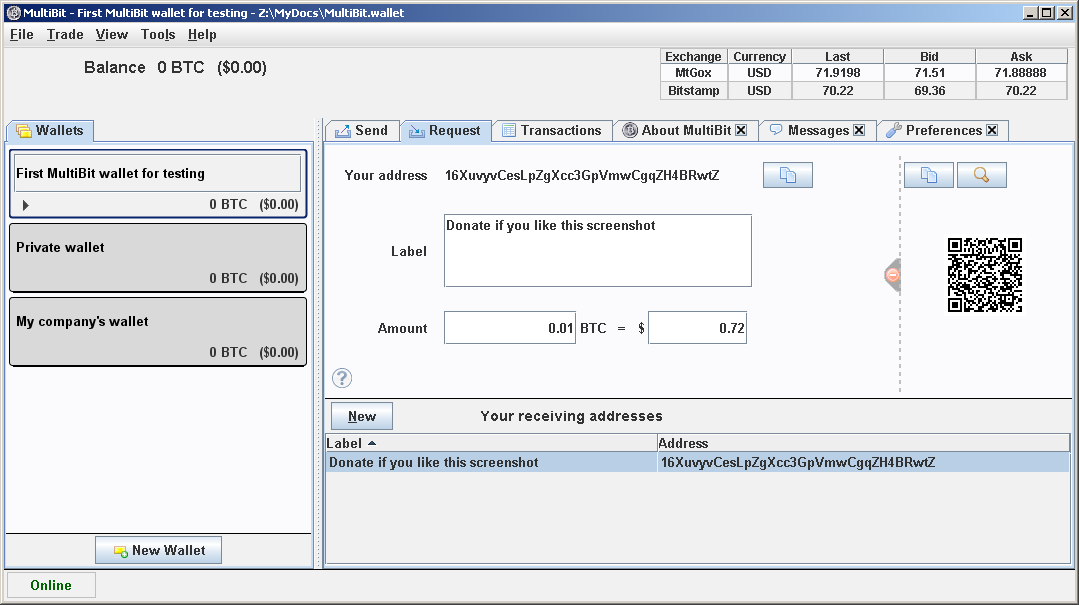MultiBit: Difference between revisions
No edit summary |
💀 Multibit ☠ |
||
| (7 intermediate revisions by 6 users not shown) | |||
| Line 1: | Line 1: | ||
[[ | [[Image:MultiBit_0.4.23_screenshot_WinXP.png|right|800px|screenshot of Multibit with its Windows XP GUI and Metal theme]] | ||
[http://multibit.org MultiBit] was a lightweight "[[Thin Client Security|thin client]]" Bitcoin wallet for Windows, MacOS and Linux based on [[BitCoinJ|bitcoinj]]. It was superseded by MultiBit HD, and the development of both stopped in 2017<ref name="acquisition">[https://www.coindesk.com/bitcoin-startup-keepkey-ends-support-multibit-wallet-software The long-running bitcoin wallet Multibit is being discontinued, the firm that bought it last year has announced]</ref> after the acquisition by ''KeepKey'', which was then bought by ''Shapeshift''. | |||
http:// | Its main advantages over the [[Bitcoin-Qt#Criticism|original Bitcoin client]] included support for opening multiple wallets simultaneously, and not requiring the download of the entire multi-gigabyte [[block chain]] (22.5GB as of October 2014<ref>[https://blockchain.info/charts/blocks-size Bitcoin Blockchain Size]</ref>). The project was lead by UK developer Jim Burton.<ref>[http://www.youtube.com/watch?v=MnkssdmlaWw European Bitcoin Conference 2012 - Jim Burton - Multibit]</ref> | ||
==Features== | |||
* Multiple wallets can be open at the same time | |||
* Synchronizes with the network in minutes | |||
* Shows the last BTC <--> USD rate from [[VirtEx]] and other exchanges | |||
* Import and export your private keys | |||
* Chart of your balance over the last 30 days | |||
* Free and open source (MIT license) | |||
* Localized in a variety of languages | |||
MultiBit | ==History== | ||
MultiBit was announced on September 12, 2011.<ref>[http://bitcointalk.org/index.php?topic=43616.0 MultiBit]</ref> Later, Multibit HD was developed, and the original MultiBit was renamed ''Multibit Classic''. On July 26, 2017, development was stopped without advance notice, due to the amount of work needed to fix bugs and keep up with Bitcoin developments.<ref name="acquisition" /> | |||
==See Also== | |||
* [[Thin Client Security]] | |||
==External Links== | |||
* Abandoned [https://github.com/jim618/multibit GitHub repo] | |||
* [https://groups.google.com/forum/?fromgroups=#!forum/bitcoin-multibit Google Group] abandoned since 2015 | |||
==References== | |||
<references /> | |||
[[Category:Clients]] | [[Category:Clients]] | ||
[[Category:Open Source]] | |||
Latest revision as of 07:33, 24 August 2020

MultiBit was a lightweight "thin client" Bitcoin wallet for Windows, MacOS and Linux based on bitcoinj. It was superseded by MultiBit HD, and the development of both stopped in 2017[1] after the acquisition by KeepKey, which was then bought by Shapeshift.
Its main advantages over the original Bitcoin client included support for opening multiple wallets simultaneously, and not requiring the download of the entire multi-gigabyte block chain (22.5GB as of October 2014[2]). The project was lead by UK developer Jim Burton.[3]
Features
- Multiple wallets can be open at the same time
- Synchronizes with the network in minutes
- Shows the last BTC <--> USD rate from VirtEx and other exchanges
- Import and export your private keys
- Chart of your balance over the last 30 days
- Free and open source (MIT license)
- Localized in a variety of languages
History
MultiBit was announced on September 12, 2011.[4] Later, Multibit HD was developed, and the original MultiBit was renamed Multibit Classic. On July 26, 2017, development was stopped without advance notice, due to the amount of work needed to fix bugs and keep up with Bitcoin developments.[1]
See Also
External Links
- Abandoned GitHub repo
- Google Group abandoned since 2015